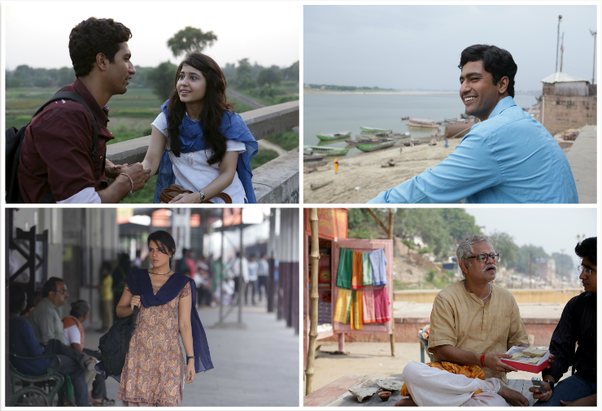From what we’ve seen of Uttar Pradesh and its hues on screen, one suspects that 1980s Banaras must not have been too different-in tradition, mentality, food, colours and, notably, Bollywood awareness-from the Banaras today. And it is perhaps this timelessness, this endearing holy static-ness in a country clinging onto change every day, that attracts curious foreign tourists and, now, Indian film crews.
Therefore, it is no indicator of era when Alka Yagnik’s familiar voice wafts through the evening air; ‘Gazab ka hai din, socho zara,‘ croons Juhi Chawla in Qayamat Se Qayamat Tak, skipping between trees, portraying the unbridled excitement of forbidden love.
In Masaan, Shaalu (Shweta Tripathi) mirrors this infectious enthusiasm, albeit more privately. Her eyes shine with the crests and troughs of this song; she quietly blushes while occupying the backseat of a bike driven by ‘male friend’ Deepak (Vicky Kaushal). They’re falling in love. They’ve kissed intensely, and debutant director Neeraj Ghaywan cuts directly to their goofy post-coital grins on the ride back home. The choice of this QSQT ballad gives you a fair idea of where their story is headed.
You’d be wrong.
They aren’t from warring families; their only fault is that they aren’t yet independent enough to act on their opinions of war and religion. He’s from the lower Domar caste and burns bodies at Harishchandra Ghat for a living; she’s an upper middle-class Gupta. This backdrop forms more than just the film’s texture. Its purpose is to educate, at times a bit simplistically, about the boy’s burning internal ambition. His civil engineering aspirations are at a dormant stage, in dire need of re-activation, and perhaps some shock therapy.
A second film intermittently interrupts this balmy balloon-and-Facebook romance. This one is about love too, but the kind that solidifies after a traumatic experience: Devi (Richa Chadda) silently mourns the loss of her first love, a man she was caught having sex with in a seedy hotel by cops. It’s easy to forget that she is being blackmailed with her taped confession, not with footage of the actual romp. Despite the humiliation that follows, not once does she let you forget that she is pining for closure, an aimless kind of redemption really, after this abrupt loss of innocence. That she watches porn to ‘educate herself’ just hours before the act paints an accurate mental image of their naive wooing phase.
The third film is about Devi’s pious Brahmin father (Sanjay Mishra), a single parent refusing to acknowledge the adulthood of his daughter, while struggling to pay off the mms-wielding cop. Here is a man who has seen ‘life, death and everything in between’, but is being buried under the weight of his own standing. An omnipresent kid loosely drives his journey on the banks of the Ganga. Not many older men, victims of egos and environments, openly embrace vulnerability and doubt the way Mishra’s face does on screen.
That I speak of three independent films is down to the atmosphere of co-writer Varun Grover’s intimate writing; his lyrical ‘tu kisi rail si‘ plays over gentle images of a couple sneaking glances at an annual fair. Been there, done that. A multi-faceted narrative is a tricky terrain to tread, but not once did the stories seem like they’re heading towards intersection. When they finally meet-the film’s only fleeting instance of actually resembling a film-its plausibility feels like a charming bonus, not a plot contrivance.
Director Ghaywan understands the aftertaste of cinematic moments and pain; he lets each of his actors break down at points during their experiences, and makes us feel like we’re invading their most private-and perhaps life-altering-minutes. Doses of positivity preceding their inevitable pain make the void much darker. When Vicky Kaushal, young actor and son of veteran action director Sham Kaushal, reaches this stage as Deepak, his unabashed wailing is so heartbreaking that I became his wise-ass friend, who breaks character just to hold him tight into the night. Sometimes, it’s not going to be okay, and that’s perfectly okay.
The filmmakers manage to create a space that puts you in their characters’ places, leaving you to imagine the loss of your own loved ones. Even for those who haven’t experienced powerful emotions, Masaan quietly penetrates the famed Varanasi pride of co-existence, and seldom romanticizes this trial by tradition. The actors may not all look like they’ve lived here, but they certainly belong here; their routines, gait, cooking, shop keeping, drinking and language look real, irrespective of authenticity. And in the hinterland, one is never too young or too old to come of age.
Pankaj Tripathi deserves a special mention for his understanding of where he appears in Devi’s journey, and his droll rendition of the intellectual ’40-year-old virgin’. A Gustavo Santaolalla-inspired score does more than provide introspective transitions; it sounds like personal music echoing in the minds of these folks as they navigate their twilight zones.
I expect speculation about foreign-film Oscar contention to begin with Masaan this year. Such hype would be reducing its worth to templates and statues far more quantitative than religious ones.
In the end, despite the meditativeness amidst its world’s inherent noise, I walked out of the film trying to complete Alka Yagnik’s final stanza between my ears, “Tum ho akele, hum bhi akele, mazza aa raha hai… kasam se. (You’re alone, I’m alone, we’re enjoying ourselves.)”
Sadness, sung in the most hopeful way.







Leave A Comment
You must be logged in to post a comment.